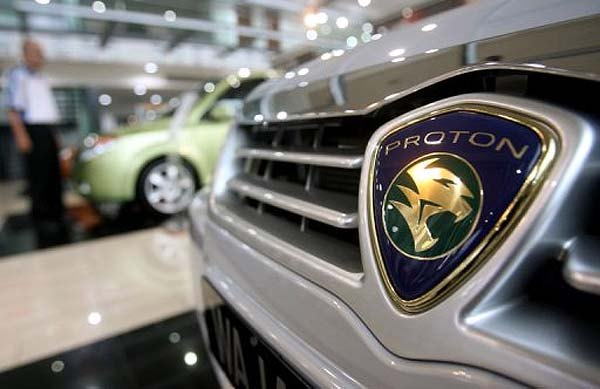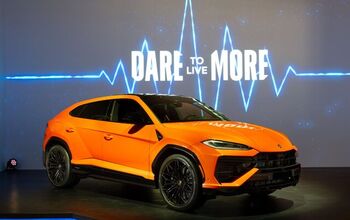Fr Elise: Volkswagen Interested In Lotus And All Of Proton While They Are At It

As you read this, an old friend of mine is probably packing. Who knows, he could already be in the air. He was Volkswagen’s boots on the ground in Malaysia, the many times VW wanted to get its boots on the ground in Malaysia. Last time they tried in 2007, they disrupted Dirk’s retirement and sent him to Kuala Lumpur, where dealers of fake watches greeted him as the old friend he was by that time. German media says, Volkswagen did not give up and they are trying again.
Volkswagen is said to be talking (again) to Malaysia’s Proton, owned by Malaysian automotive and property conglomerate DRB-HICOM. Now is a good time to buy. Lotus, owned by Proton, has burned through all of a loan facility made available. DRB-Hicom pumped another $300 million into Lotus this year and is looking at pumping more. The departure of the flamboyant, but unimportant Dany Bahar from the flamboyant, but unimportant Lotus made bigger headlines than the fact that this is yet another supercar pipedream going up in smoke, but that’s the way it is. Three days ago, it was reported that Proton rejected an offer of one British pound for Lotus. That’s how much the brand is worth now.
Proton, a brainchild of former Prime Minister Mahathir Mohamad, was supposed to propel Malaysia as much into the future as its electronics industry. It did not happen. Mitsubishi pulled out a few years ago. Lotus, the maker of lightweight sports cars, was no replacement for a heavyweight international partner. Proton only survived, more or less, due to protectionist laws in Malaysia. In the meantime, Malays begin to rebel against high priced low tech cars. The ASEAN Free Trade Agreement exposes Proton to the increasingly rough winds of competition.
Volkswagen probably would not mind adding yet another brand to its growing collection, especially when it means that they can invest the very important South East Asian market with Volkswagen’s bread and butter cars. Volkswagen already contracted Proton for CKD production of the Passat. Jetta and Polo are planned to follow, says Reuters. Germany’s Manager Magazin said last week that Volkswagen could be interested yet again in Proton. Today, two inside sources told Reuters that Volkswagen might “seek either a minority holding in the owner of UK sports-car manufacturer Lotus or a controlling stake.”
I tried calling my friend in Germany, but nobody is picking up.

Bertel Schmitt comes back to journalism after taking a 35 year break in advertising and marketing. He ran and owned advertising agencies in Duesseldorf, Germany, and New York City. Volkswagen A.G. was Bertel's most important corporate account. Schmitt's advertising and marketing career touched many corners of the industry with a special focus on automotive products and services. Since 2004, he lives in Japan and China with his wife <a href="http://www.tomokoandbertel.com"> Tomoko </a>. Bertel Schmitt is a founding board member of the <a href="http://www.offshoresuperseries.com"> Offshore Super Series </a>, an American offshore powerboat racing organization. He is co-owner of the racing team Typhoon.
More by Bertel Schmitt
Latest Car Reviews
Read moreLatest Product Reviews
Read moreRecent Comments
- W Conrad I'm not afraid of them, but they aren't needed for everyone or everywhere. Long haul and highway driving sure, but in the city, nope.
- Jalop1991 In a manner similar to PHEV being the correct answer, I declare RPVs to be the correct answer here.We're doing it with certain aircraft; why not with cars on the ground, using hardware and tools like Telsa's "FSD" or GM's "SuperCruise" as the base?Take the local Uber driver out of the car, and put him in a professional centralized environment from where he drives me around. The system and the individual car can have awareness as well as gates, but he's responsible for the driving.Put the tech into my car, and let me buy it as needed. I need someone else to drive me home; hit the button and voila, I've hired a driver for the moment. I don't want to drive 11 hours to my vacation spot; hire the remote pilot for that. When I get there, I have my car and he's still at his normal location, piloting cars for other people.The system would allow for driver rest period, like what's required for truckers, so I might end up with multiple people driving me to the coast. I don't care. And they don't have to be physically with me, therefore they can be way cheaper.Charge taxi-type per-mile rates. For long drives, offer per-trip rates. Offer subscriptions, including miles/hours. Whatever.(And for grins, dress the remote pilots all as Johnnie.)Start this out with big rigs. Take the trucker away from the long haul driving, and let him be there for emergencies and the short haul parts of the trip.And in a manner similar to PHEVs being discredited, I fully expect to be razzed for this brilliant idea (not unlike how Alan Kay wasn't recognized until many many years later for his Dynabook vision).
- B-BodyBuick84 Not afraid of AV's as I highly doubt they will ever be %100 viable for our roads. Stop-and-go downtown city or rush hour highway traffic? I can see that, but otherwise there's simply too many variables. Bad weather conditions, faded road lines or markings, reflective surfaces with glare, etc. There's also the issue of cultural norms. About a decade ago there was actually an online test called 'The Morality Machine' one could do online where you were in control of an AV and choose what action to take when a crash was inevitable. I think something like 2.5 million people across the world participated? For example, do you hit and most likely kill the elderly couple strolling across the crosswalk or crash the vehicle into a cement barrier and almost certainly cause the death of the vehicle occupants? What if it's a parent and child? In N. America 98% of people choose to hit the elderly couple and save themselves while in Asia, the exact opposite happened where 98% choose to hit the parent and child. Why? Cultural differences. Asia puts a lot of emphasis on respecting their elderly while N. America has a culture of 'save/ protect the children'. Are these AV's going to respect that culture? Is a VW Jetta or Buick Envision AV going to have different programming depending on whether it's sold in Canada or Taiwan? how's that going to effect legislation and legal battles when a crash inevitibly does happen? These are the true barriers to mass AV adoption, and in the 10 years since that test came out, there has been zero answers or progress on this matter. So no, I'm not afraid of AV's simply because with the exception of a few specific situations, most avenues are going to prove to be a dead-end for automakers.
- Mike Bradley Autonomous cars were developed in Silicon Valley. For new products there, the standard business plan is to put a barely-functioning product on the market right away and wait for the early-adopter customers to find the flaws. That's exactly what's happened. Detroit's plan is pretty much the opposite, but Detroit isn't developing this product. That's why dealers, for instance, haven't been trained in the cars.
- Dartman https://apnews.com/article/artificial-intelligence-fighter-jets-air-force-6a1100c96a73ca9b7f41cbd6a2753fdaAutonomous/Ai is here now. The question is implementation and acceptance.


































Comments
Join the conversation
I think your all missing the really obvious reason for VW to buy Lotus. Lotus had great success with performance versions of Fords and Vauxalls. Think how they could rescue Seat.
Uncle Ferdinand has Porsche, Audi, Bugatti, Bentley and Lamborghini to ask for advice.